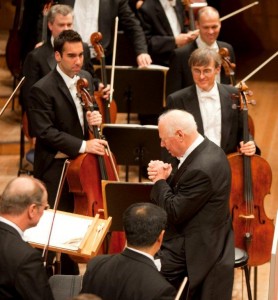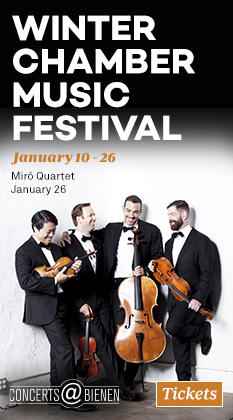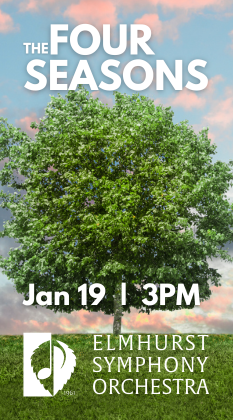Haitink’s fanatical view of Beethoven proves an electric experience
Regrettably, principal conductor Bernard Haitink departs his Chicago Symphony post next week, but the 81-year-old will return to Orchestra Hall around this time next year for concerts of late Mahler and Brahms. This should ease the pain to those palpably moved and excited by Tuesday’s electric entry into this season-ending Beethoven festival. Anchoring this series with a complete symphony cycle, Haitink has practically given us a snapshot into a personal journal that highlights his important six-decade-long career.
The last big statement he made before this weekend’s all-conquering Ninth was a divine recreation of the Seventh Symphony, impeccably supported with luscious playing and a seemingly uninhibited rhythmic energy. How Haitink savors each tiny episode with flavorful pauses allows the developing sections to open up more forcefully, and there is such logic and panoramic breadth in his view of this music that it scarcely sounds interpreted. It didn’t hurt either to be aided so wonderfully by flutist Mathieu Dufour’s stylish handiwork.
The sublimely grievous Allegretto, here snappier paced than normal, melted under CSO cellists Kenneth Olsen and John Sharp’s soulful opening lament. The trio of French horns, yet again without its veteran principal leader, was a consistently bold presence on stage Tuesday night. Haitink brought a whirling kinetic energy to the finale, which gave the illusion of a firebrand maestro 40 years his junior. Reluctant to come off these highs, a rowdy crowd begged him for more.
Throughout this festival, the Leonore Overtures have been no less consuming despite their smaller scale. Under Haitink’s wand, this long cherished No.3 blossomed into a stunning orchestral showpiece as Christopher Martin’s haunting offstage trumpet foretold Florestan’s fate. The brilliance of balance in the high strings suggested the dawn of a new golden age for these musicians, if there isn’t one already.
By comparison it was probably the night’s opener, the Symphony No.1, which seemed lowest calorie, but this was most gratifying in its own way. Haitink here acted like a zealous sound technician, drawing a gauzy clarity in each of the reduced orchestra’s sections. I was reminded of a florid tapestry with all of its different embroideries perfectly in view.
He also humorously accented phrases with near exaggeration as if tipping a hat to the work’s Classical forebears. (The stilted, rising bassoon accompaniment in the last movement’s main theme, for instance, sounded deliciously old fashioned.) Even if the symphony’s opening released less tension than desired, conductor and orchestra gathered an abundance of energy that pushed it to a conclusion of maximum impact.
Indeed, there is a fanatical point of view in Haitink’s Beethoven, often disguised as less than that by this outwardly humble and reverential artist. In a way, the festival is as much a Bernard Haitink tribute as it is a homage to the scowling Great One who is postered everywhere above Michigan Avenue. They are a pair to be relished.
The program will be repeated 8 p.m. Wednesday. www.cso.org; 312-294-3000.
Posted in Performances




